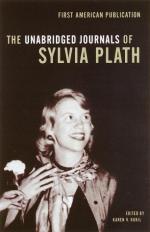|
This section contains 5,582 words (approx. 19 pages at 300 words per page) |

|
SOURCE: "Sylvia Plath and Confessional Poetry: A Reconsideration," in Iowa Review, Vol. 8, No. 1, 1977, pp. 104-15.
In the following essay, Uroff contrasts Plath's poetic voice with the confessional mode developed by American poet Robert Lowell. Uroff contends that Plath, unlike Lowell, incorporates abstracted autobiographic detail in her poetry only to amplify or dramatize feelings of pain and sorrow rather than to induce actual self-revelation.
When M. L. Rosenthal first used the term, confessional poetry, he had in mind a phase in Robert Lowell's career when Lowell turned to themes of sexual guilt, alcoholism, confinement in a mental hospital, and developed them in the first person in a way that intended, in Rosenthal's view, to point to the poet himself. Rosenthal was careful to limit the possibilities of the mode but he did name Sylvia Plath a confessional poet as well because, he said, she put the speaker herself at...
|
This section contains 5,582 words (approx. 19 pages at 300 words per page) |

|


